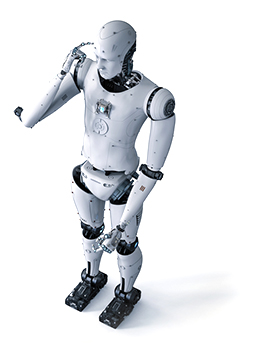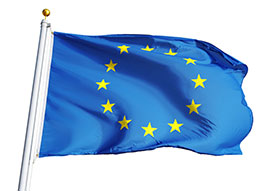23 August 2017
 UniSA’s Hawke EU Centre for Mobilities, Migrations and Cultural Transformations has been awarded two major research grants through European Commission funding under the highly prestigious Jean Monnet Actions.
UniSA’s Hawke EU Centre for Mobilities, Migrations and Cultural Transformations has been awarded two major research grants through European Commission funding under the highly prestigious Jean Monnet Actions.
The awards have been won by Professors Anthony Elliott and Susan Luckman to explore the impacts of new AI and robotic technologies on workplace change and to develop participation in the creative industries across the European Union and Australia.
Jean Monnet Activities are designed to promote excellence in research and public outreach in the field of European Union studies worldwide. The activities also foster dialogue between the academic world and policy-makers, in particular with the aim of enhancing governance of EU policies.
Dean of External Engagement and Executive Director of the Hawke EU Centre, Professor Anthony Elliott, says the grants will significantly contribute to UniSA’s development of its research partnerships in Europe, facilitating collaboration with a number of high profile European universities and institutions.
“The Erasmus+ Monnet Actions are highly sought after,” Prof Elliott says, “and what’s exceptionally pleasing is that these UniSA awards were part of only 30 grants selected from over 1000 applications by the EU Foreign Partnership Instrument agency.
 “This is a great boost for the Hawke EU Centre and the promotion of Adelaide’s engagement with the European Union.”
“This is a great boost for the Hawke EU Centre and the promotion of Adelaide’s engagement with the European Union.”
The Hawke EU Centre for Mobilities, Migrations and Cultural Transformations was established in 2014, under the terms of a $1.5 million funding agreement between the European Commission and UniSA.
Professor Luckman’s project - Creative Industries and the Digital Economy as Drivers of EU Integration and Innovation – will draw on a team of about 40 researchers and educators from UniSA, the EU and Russia to develop a set of research-informed guidelines for how EU-relevant business skills and personal competencies can be better embedded into university creative industries courses and programs within the EU, Australia and Russia.
Prof Luckman says while Europe has world-leading cultural and creative industries, there has been uneven participation despite the opportunities afforded by the digital single market.
“Creative industries including galleries, libraries, archives and museums and everything from art and crafts to music, drama, fashion, journalism, publishing, filmmaking, games software development, journalism and publishing are important contributors to economic and cultural life,” Prof Luckman says.
“What we can see though is that often, tradition, cultural history, economic wealth and natural resources have seen some regions develop dominance in certain industries.
“We will identify how better to prepare and support creative micro-enterprise take advantage of the transnational opportunities of digital media through hosting an international research workshop at Trinity College Dublin which will explore what practices, learning and partnerships can be put in places to help ensure excellence and breadth in the creative industries.”
Prof Luckman says as part of the project and working with the Copenhagen Business School, teams of UniSA undergraduate students, guided by academic and industry advisors, will apply Entrepreneurial Discovery Processes and design thinking to address ‘real world’ governmental challenges.
The winning UniSA team will fly to Europe to participate in the EU roll-out of this innovative UniSA work-integrated learning framework.
And in a project at the forefront of social and industrial change, Professor Elliott will be leading a study into the impact of robotics and perceptions of the impact of robotics in both the EU and Australia.
The project involves research collaboration with universities and industry in Germany, Poland and Finland.
“The field of robotics and AI promises to be one of the most profound disruptive technological shifts since the Industrial Revolution,” Prof Elliott says.
“The advent of supercomputers, intelligent machines, robots and algorithms ushers in a world for which much of the developed world is not prepared, and against which government policy and intervention - on regional and global levels - is increasingly vital.
“This project will focus on EU policy in key areas of technological innovation and employment changes, and we will be looking at what lessons Australia can learn from these innovations”.
“We are planning key workshops in three European regions and an international multidisciplinary conference in Australia – bringing EU and Australasian academics together with industry, business, policy makers and community stakeholders to share ideas.”
Prof Elliott says the workshops will look at EU innovation and cohesion policies; the diversity of region-specific challenges and opportunities around robotics; AI technologies and the redefinition of digital skills; and, the importance of EU perceptions for effectively implementing policies aimed at the socially inclusive management of these technological transitions.
“We also want to tie in the Australian connection by looking at European approaches for Australasia, and the alignment of Australasian policy discourses with EU policy and investment,” he says.
Media contact: Michèle Nardelli mobile 0418 823 673 email michele.nardelli@unisa.edu.au


